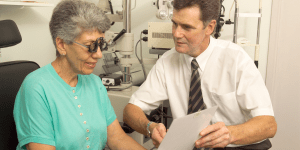1:30min

Dementia is a condition that affects millions of lives worldwide and Australia is no exception.
According to Dementia Australia more than 400,000 Australians are currently living with dementia and this number is expected to rise in the coming years.
What’s more, the impact extends beyond those directly affected, with an additional 1.5 million people (equivalent to around 1 in 20 Aussies) involved in the care of someone with dementia.
Being Dementia Action Week 2023, it’s a pertinent time to acknowledge the significance of those healthcare challenges that extend beyond the condition itself and the actions being taken to address them.
This year, the theme for Dementia Action Week is “Act Now for a Dementia-Friendly Future”.
Taking on this call to action to create a more inclusive and supportive environment for individuals living with dementia is Dr. Marianne Coleman, a Clinical Vision Research Fellow based in Melbourne.
Dr. Coleman’s groundbreaking efforts have led to the creation of an invaluable resource – an information booklet about eye tests tailored specifically for people living with dementia.
Poor eyesight can make living with dementia more difficult; however, a visit to the optometrist for a routine eye exam can become a daunting experience for people with dementia and their caregivers.
The information booklet designed by Dr. Coleman, with Dementia Advocates, includes a discreet card that allows individuals with dementia and their caregivers to declare their diagnosis to the optometrist before the eye examination begins.
This was inspired by Dr. Coleman’s research, which suggested people with dementia and carers were unsure whether the dementia diagnosis was relevant to their eye examination, or what would change about their experience if they notified the optometrist in advance.
This small but crucial step helps ensure that the eye test is adapted to accommodate their unique needs.
Moreover, it enables them to communicate the type of dementia they have and any difficulties they might face during the examination, such as spatial navigation issues, concentration problems or decreased energy levels.
In this short video, Dr. Coleman explains how this information booklet works and the positive impact it can have on the lives of people living with dementia.
Dr. Coleman’s role as a Clinical Vision Research Fellow spans between the National Vision Research Institute at the Australian College of Optometry and the Department of Optometry and Vision Sciences at the University of Melbourne.
Her ongoing work aims to break down the barriers that often hinder access to dementia-friendly eye care, ensuring that those with dementia can maintain their independence and live at home for as long as possible.
Improving the eyecare experience for individuals with dementia is not just about better vision; it’s about enhancing their quality of life and helping carers too, as time spent on care tasks can increase significantly when a person with dementia is also living with vision impairment.
Dr. Coleman’s pioneering work serves as an inspiring example of what can be achieved when we act now for a dementia-friendly future.
If you’re interested in learning more about Dr. Marianne Coleman’s ongoing work in this field, you can read about it here.
To find your closest dementia-friendly optometrist, check out Optometry Australia’s “Find an Optometrist”search tool today.